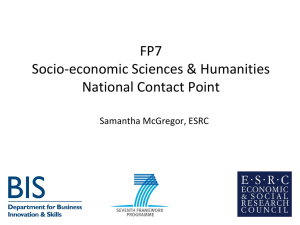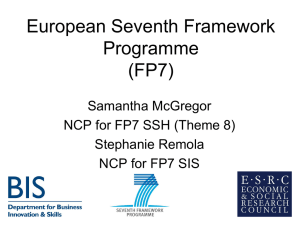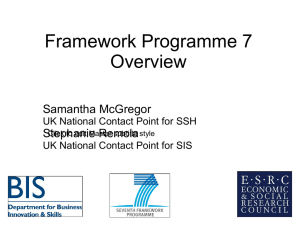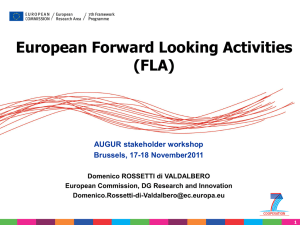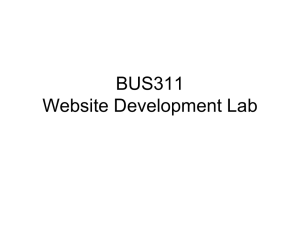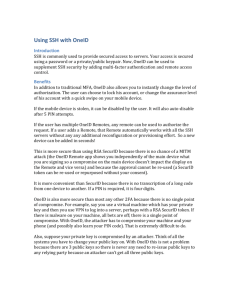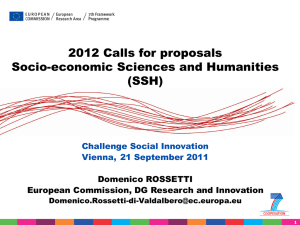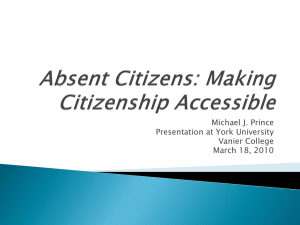emerging trends in socio-economic sciences and humanities in
advertisement
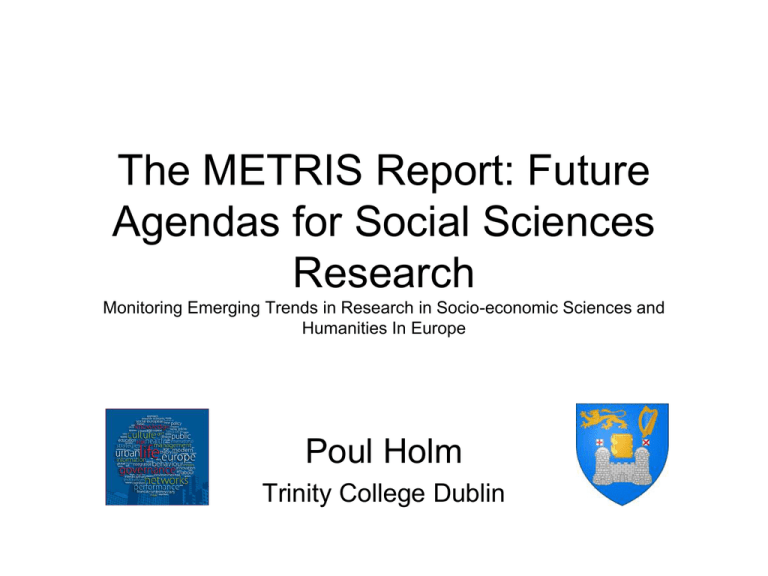
The METRIS Report: Future Agendas for Social Sciences Research Monitoring Emerging Trends in Research in Socio-economic Sciences and Humanities In Europe Poul Holm Trinity College Dublin EU Framework context • Mission-oriented / Diffusion-oriented • Research priorities / Grand challenges • Targeted SS(H) – (these) “targeted socio-economic research activities aim at elucidating decision-making in future by developing a shared knowledge base on the challenges facing Europe” (Council decision for TSER Programme 1994) Anneli PAULI Chapter 1 Introduction • METRIS: The primary purpose to identify important emerging trends in SSH research – not an exercise in mapping aimed at an exhaustive picture – Rather, an exercise in judgement, and as such was conditioned by the composition of the expert group Priority areas FP7 + – Growth, employment and competitiveness in a knowledge society – Combining economic, social and environmental objectives in a European perspective – Major trends in society and their implications – Europe in the world – The citizen in the European Union – Beyond FP7: cross-cutting trends – recommendations for further action – The report does not cover the important contribution of SSH to the other nine themes of FP7 although overlapping interests may be identified Chapter 1 How do we identify a trend? By means of informed guesswork which identifies • Major trends in society: – Socially/politically recognised problems – To which degree are they being picked up by research? • Major trends in research – Academic problems – Are they socially relevant? Chapter 3 Growth, Employment and Competitiveness in a Knowledge-Based Society • The study of innovation will remain high on the agenda – in particular analyses focusing on the institutional and social dimensions of innovation and creativity • The emphasis placed on the role of intangibles in the socalled knowledge economy will increase researchers’ interest in – – – – human, social and cultural capital in the experience economy in measures of value Social welfare as a productive factor • With the current economic crisis issues of financial stability and economic governance are also coming back to the fore. Chapter 4 Citizenship • How are societies kept together? • Research will maintain a focus on issues of constitutionalism and formal citizenship • New focus on the proliferation of different types of citizenship – religious, sexual, scientific, biological citizenship • New forms of participation in the public sphere, and new participant subjects – such as corporations • Researchers increasingly understand citizenship by analysing its limits or its confines and by looking at noncitizens Chapter 5 Combining Economic, Social and Environmental Objectives • How can we achieve multiple goals at one time? • A growing engagement of the SSH with the study of the environment in its various dimensions – biodiversity, landscapes, or conservation – socioeconomic consequences of climate change • New approaches to social cohesion and to the analysis of social inequalities – new emphasis on globalising trends • Alternative models of growth and alternative theories of value • Studies of risk and risk-management Chapter 6 Europe and the World • What is the role of Europe in the world? – EU support plays a significant role relative to the support at national levels • Europe’s place in multilateral frameworks • European identity and the social and political dimensions of memory • The markets for education and research of a knowledge-based economy • Global circuits of cultural and immaterial artefacts Chapter 7 Beyond The FP7 Rubrics: A Few Examples • How are the SSH transforming itself and society with new research questions? • The ‘iconic turn’ – the role of images, visualisations and iconic languages delineates a complex ecology of the visual • New approaches to space and spatiality – The importance of physical space and the rethinking of many territorialised concepts • A renewed interest in affects and emotions • The erosion of the traditional boundaries of scientific research Cross-cutting themes for coordinated support • The future of and new forms of social welfare • A new research agenda on migration breaking with methodological nationalism • Interdisciplinary research on innovation • Sustainability research on the ‘post-carbon’ city • New approaches to value and valuation in the context of knowledge economies • Space, landscape and virtuality as new socio-political environments • Time and memory as social formations and as political issues • The technologisation of research in the social sciences and the humanities • The iconic turn and the analysis of iconospheres • New approaches to governance and regulation • = amenable to FLA Design has supplanted tradition • We question, redefine and reshape processes and products by choosing elements of disparate origin and context • Design-thinking provides us with hitherto unknown freedom, room for creation and widening horizons • The flipside is a constant fear that we ourselves and what we believe in may be made redundant and emptied of meaning and purpose • = not amenable to FLA “most authors discussing scenario analysis recommend the use of multiple scenarios. The future is uncertain, and analysis of just one scenario does little to communicate much about the range of opportunities and challenges liable to confront us.” (p.72) • • “Social scientists’ foresight has been poor at key junctures, and social science’s influence a mixed blessing. Social scientists did not foresee the fall of the Berlin Wall in 1989, which was afterwards prominently interpreted as ‘the end of history’ – the final victory of constitutional democracy and free markets. As the current economic crisis was unfurling in October 2008, Alan Greenspan, recognized as ‘the maestro’, and the chair of the US Federal Reserve from 1987 to 2006, conceded that his free-market conception of shunning regulation was deficient. ‘Yes, I found a flaw’, he said in a congressional hearing: ‘That is precisely the reason I was shocked because I’d been going for 40 years or more with very considerable evidence that it was working exceptionally well.’ His social science map no longer provided guidance. In Malawi, the World Bank has undertaken self-criticism for pushing private markets, opposing government regulation and fertilizer subsidies aimed at promoting cash crops for exports – a policy that resulted in food shortages. More broadly, from Marx and Myrdal to the Washington consensus, development theories have been only modestly successful. Furthermore, part of the diagnosis of the present global economic predicament is that social scientists were instrumental in constructing – or misconstructing – both the toxic ‘financial instruments’ and flawed institutions. More than that, social scientists, sometimes for opportunistic reasons, did not understand how their own creation worked or monitor how it unfolded. In short: if it is not good when the social science models of the world are misconstrued, it is even worse when its models for the world lead to misconstruction of the world itself.” World Social Science Report, pp vi • “The quest for relevance in the social sciences triumphed during the mid-twentieth century, celebrating planning, social engineering and foresight. Its latest embodiment is the belief in evidence-based policy. Yet, it is often difficult to discern which kind of evidence counts in a given situation, whose evidence is to be used, and for what purpose....” • “Shifting from relevant knowledge to socially robust knowledge includes multiple, even contradictory, perspectives.” Helga Nowotny, in World Social Science Report, pp 320-1 FLA • Politicians like choices • And researchers may provide evidencebased foresights in restricted set-ups • What works in the class-room, what incentives work in which environments, etc. • But social innovation is endlessly surprising – And defeats foresight and politics! • So good SSH for politics must prepare us – to navigate more often than manage the future – To embrace innovation more often than predict Media Analytical power Tourism, ICT Knowledge Transfer Partnerships Heritage Value systems Environment Urban development Coping with change Social cohesion Cultural acceptance Pride
